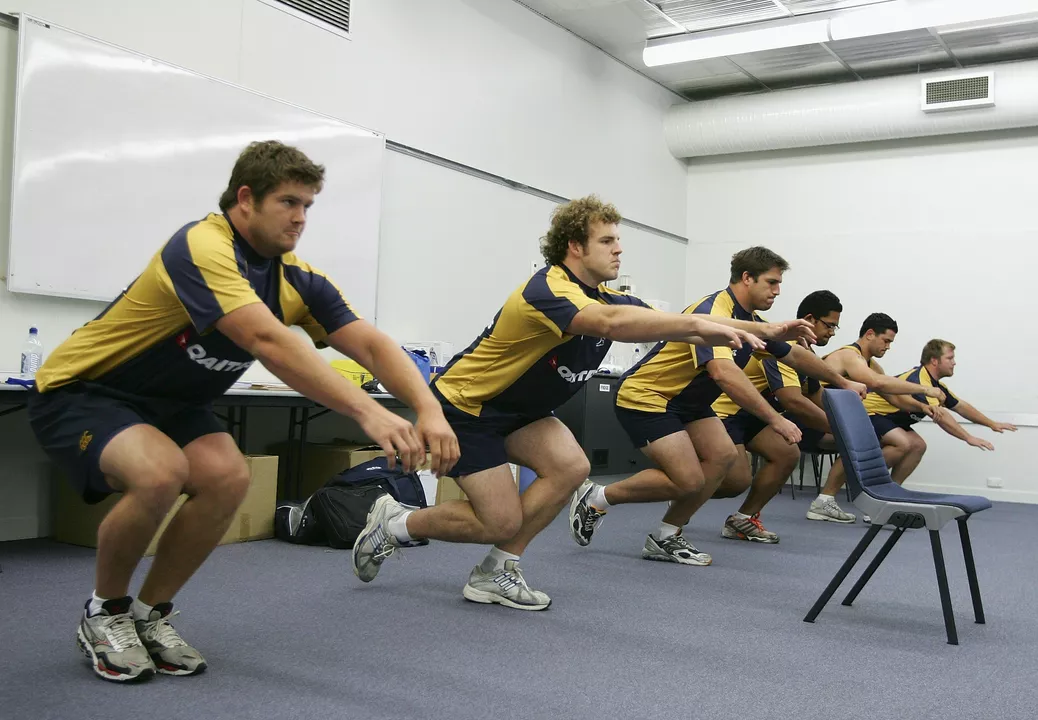5 Essential Tips for Training for Rugby
Tip 1: Make Sure You Have the Right Gear
The right gear is essential for any rugby practice or game. You should have a good pair of rugby boots, a good quality rugby ball and protective gear such as a gumshield and headgear. You should also have appropriate clothing for the weather and for the type of rugby you are playing such as shorts or a long-sleeved jersey. Make sure you have all the necessary equipment for training and matches.
Tip 2: Develop and Strengthen Core Muscles
Having strong core muscles is essential for rugby players. Your core muscles provide stability and power for your movement, so it is important to strengthen them. You should do a variety of exercises to target different areas such as planks, sit-ups, and Russian twists. You should also focus on strengthening your lower body muscles such as your quads, hamstrings, and calves.
Tip 3: Improve Endurance
Rugby is a physically demanding sport so it is important to have good endurance. To improve your endurance, you should focus on running and cycling. You can also do interval training which involves short bursts of intense exercise followed by rest periods. This type of training is great for improving your endurance and preparing you for the rigours of a rugby match.
Tip 4: Understand the Rules
It is important to understand the rules of rugby before you start playing. The rules of rugby can be complicated so it is important to take the time to learn them. You should also learn the different types of tackles and the different types of passes in the game. Understanding the rules will help you to play the game more effectively.
Tip 5: Practice Your Skills
The key to becoming a successful rugby player is to practice your skills regularly. You should focus on drills such as passing, tackling, and kicking. You should also practice game-specific skills such as scrums and lineouts. Practicing your skills will help you to become a better player and will make you more competitive.
Getting Started: How to Create a Rugby Training Program
Are you ready to take your rugby game to the next level? Whether you’re a veteran player or just starting out, the key to success is the same: a comprehensive, personalized training program that will keep you in peak physical shape all season long. Here’s what you need to know to get started.
1. Set Goals
Before you can jump into a training routine, you need to identify your goals. Are you looking to improve your speed, agility, and endurance? Get stronger and more explosive? Increase your vertical jump? Your goals will help shape your plan, so it’s important to give them some thought before you begin.
2. Assess Your Current Fitness Level
Once you’ve set your goals, you need to assess where you’re currently at. Are you already in good shape? Do you need to start from the ground up? Knowing your starting point will help you create a plan that’s tailored to your individual needs.
3. Find a Training Program
The next step is to find a training program that will help you reach your goals. There are plenty of rugby-specific programs available online, or you can opt for a more generic program tailored to your fitness level. Whichever you choose, make sure it’s tailored to your needs and fits your schedule.
4. Stick to a Schedule
Once you’ve found a program, it’s time to commit to it. Structure is key to success, so set aside specific days and times for your workouts and stick to them. It’s also important to give yourself some rest days to ensure you don’t overtrain. You should also plan for recovery days, as well as days when you can focus on skill work and drills.
5. Track Your Progress
Finally, track your progress and adjust your training accordingly. This will help you identify areas for improvement and ensure you’re staying on track. You can also use your progress to measure your success and keep yourself motivated.
Strength Training for Rugby: What Exercises to Focus On
Rugby is a sport that requires physical strength, speed, and agility. It is important for rugby players to have a well-balanced training program that combines both strength and conditioning exercises. Strength training is an essential component of any rugby training program because it helps build muscle and increases power. In order to perform at their best, rugby players must focus on specific exercises that will help them reach their goals.
The most important muscle groups to focus on when training for rugby are the legs, back, chest, and core. Squats, deadlifts, and lunges should be a staple in any rugby strength training program, as they target the major muscles of the lower body. In addition, rugby players should incorporate exercises such as pull-ups, push-ups, and rows to strengthen their upper body. Core exercises such as planks, mountain climbers, and Russian twists are also important for building core strength and stability.
Rugby players should also incorporate explosive exercises into their strength training program. Plyometric exercises such as box jumps, medicine ball throws, and jump squats help build power and speed. These exercises help rugby players generate more force in a shorter amount of time, which can help them achieve greater success on the field.
Finally, it is important for rugby players to incorporate resistance training into their strength training program. Resistance bands and weights can be used to increase the intensity of any exercise. These tools can be used to target smaller, stabilizing muscles that are often overlooked during traditional strength training.
Strength training is an essential component of any rugby training program. By focusing on the major muscle groups and incorporating explosive and resistance exercises, rugby players can maximize their performance. A well-rounded training program that includes both strength and conditioning exercises is sure to help players achieve their goals.
Nutrition for Rugby Players: What to Eat to Fuel Your Performance
Playing rugby demands tremendous physical and mental energy. Eating the right foods is essential in helping a rugby player perform their best. To fuel your performance and keep your body in top physical condition, you should be aware of the importance of proper nutrition and hydration.
Getting the Right Calories
It is important to focus on eating the right number of calories for your body size, as well as your activity level. The number of calories you need will depend on your age, gender, weight, and current activity level. A general rule of thumb is that active rugby players need between 2,000 and 2,800 calories per day, depending on their size and activity level.
What to Eat
Rugby players should focus on eating a balanced diet that consists of lean proteins, complex carbohydrates, healthy fats, and lots of fresh fruits and vegetables. Eating lean proteins such as lean beef, chicken, fish, and eggs will help provide your body with the essential amino acids it needs to build and repair muscles. Complex carbohydrates like oats, quinoa, sweet potatoes, brown rice, and whole wheat bread will provide your body with energy. Healthy fats such as nuts, avocados, and olive oil can help your body absorb important vitamins and minerals. Fresh fruits and vegetables are packed with vitamins and minerals that are essential for optimal performance.
Hydration
It’s also important to stay hydrated when playing rugby. Make sure to drink plenty of water throughout the day, and avoid sugary drinks and alcohol. Dehydration can cause fatigue, cramps, and poor performance.
Pre-Game Meal
It is important to fuel your body with the right foods before a game. Eating a meal that is high in carbohydrates and low in fat will provide your body with the energy it needs to perform at its best. Try to eat at least 2-3 hours before the game to give your body enough time to digest the food. Some good pre-game meal options include oatmeal with fruit, whole-wheat toast with peanut butter, or a turkey sandwich on whole-wheat bread.
Post-Game Meal
After a game, you need to refuel your body with the right foods. Your post-game meal should be high in protein and low in fat. Eating a protein-rich meal after a game will help your body to repair and rebuild muscles. Some good post-game meal options include grilled chicken with brown rice and vegetables, fish with quinoa and a vegetable side, or a turkey wrap with spinach and avocado.
Eating the right foods and staying hydrated is essential for rugby players who want to perform their best. Eating a balanced diet that consists of lean proteins, complex carbohydrates, healthy fats, and fresh fruits and vegetables can help you stay energized, focused, and in top physical condition.


